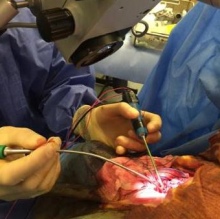Vibrating scalpel developed by Imperial College students for safer brain surgery
by Jo Seed

Students at Imperial have developed a vibrating scalpel for surgeons that may help make delicate brain surgery safer for patients.
The scalpel detects the pressure a surgeon is applying to brain tissue, and vibrates if this pressure exceeds a certain limit.
This allows the surgeon to immediately adjust the pressure, to ensure they do not harm delicate tissue.
 The device was developed by PhD students Christopher Payne and Hani Marcus. Their inspiration for the device came from early experiences as neurosurgical trainees. They recognised first-hand how difficult it is to learn how much force is appropriate when handling delicate tissue and witnessed how serious the consequences can be if too much force is exerted.
The device was developed by PhD students Christopher Payne and Hani Marcus. Their inspiration for the device came from early experiences as neurosurgical trainees. They recognised first-hand how difficult it is to learn how much force is appropriate when handling delicate tissue and witnessed how serious the consequences can be if too much force is exerted.
Large, complex and expensive master-slave robots (like the da Vinci robot) can sometimes be used to measure and regulate the forces exerted by surgeons. Chris and Hani had been developing small, simple, and affordable handheld instruments and realised that they might be able to do the same job at a lower cost.
The device won the 2014 Student Challenges Competition, run by the Institute of Global Health Innovation at Imperial. The students scooped the top prize of £5000.
The instrument has immense potential to reduce this risk of surgeons applying too much pressure in brain surgery, in particular, when young surgeons in training are operating.
– Dr Dipankar Nandi
Consultant Neurosurgeon at St Marys Hospital in London
Dr Dipankar Nandi, Consultant Neurosurgeon at St Marys Hospital in London and Chris and Hani’s supervisor said “Neurosurgery involves handling and dissecting delicate tissue, often of functionally critical areas of the brain and spinal cord. The potential for causing injury and consequently significant neurological deficit involving vital functions like the use of limbs, vision, hearing, speech and higher cognitive functions like memory, sensory processing and learning are real hazards. Hani and Christopher have developed an instrument that has immense potential to reduce this risk, in particular, when young surgeons in training are operating. This technology (and it can be applied to other instruments like dissectors and forceps) will help to significantly reduce the learning curve that currently relies heavily on experience.”
Other winners from this year’s competition include a new biosensor platform technology called DaPHNI, for the detection of blood protein biomarkers to gauge a patient’s health.
The device which was designed by Nicolas Kylilis, who aims to improve upon the existing health diagnostic tools available to patients by providing low cost biosensors that can be used routinely to diagnose conditions with complex diagnostic profiles..
This year’s competition is now open to undergraduate and postgraduate students from across the country. For more details on how to enter go to: http://www.imperial.ac.uk/global-health-innovation/student-hub/student-challenges-competition/. Closing date for entries is Jan 8th 2016.
Article text (excluding photos or graphics) © Imperial College London.
Photos and graphics subject to third party copyright used with permission or © Imperial College London.
Reporter
Jo Seed
Institute of Global Health Innovation